Related Research Articles

Alchemy is an ancient branch of natural philosophy, a philosophical and protoscientific tradition that was historically practiced in China, India, the Muslim world, and Europe. In its Western form, alchemy is first attested in a number of pseudepigraphical texts written in Greco-Roman Egypt during the first few centuries AD.

Ramon Llull was a philosopher, theologian, poet, missionary, and Christian apologist from the Kingdom of Majorca.
Diogenes Laërtius was a biographer of the Greek philosophers. Nothing is definitively known about his life, but his surviving Lives and Opinions of Eminent Philosophers is a principal source for the history of ancient Greek philosophy. His reputation is controversial among scholars because he often repeats information from his sources without critically evaluating it. He also frequently focuses on trivial or insignificant details of his subjects' lives while ignoring important details of their philosophical teachings and he sometimes fails to distinguish between earlier and later teachings of specific philosophical schools. However, unlike many other ancient secondary sources, Diogenes Laërtius generally reports philosophical teachings without attempting to reinterpret or expand on them, which means his accounts are often closer to the primary sources. Due to the loss of so many of the primary sources on which Diogenes relied, his work has become the foremost surviving source on the history of Greek philosophy.
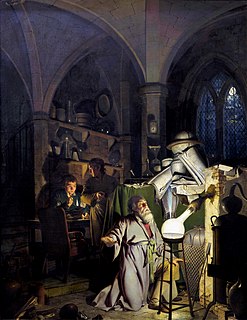
The philosopher's stone, more properly philosophers' stone or stone of the philosophers, is a mythic alchemical substance capable of turning base metals such as mercury into gold or silver. It is also called the elixir of life, useful for rejuvenation and for achieving immortality; for many centuries, it was the most sought goal in alchemy. The philosophers' stone was the central symbol of the mystical terminology of alchemy, symbolizing perfection at its finest, enlightenment, and heavenly bliss. Efforts to discover the philosopher's stone were known as the Magnum Opus.
According to ancient and medieval science, aether, also known as the fifth element or quintessence, is the material that fills the region of the universe beyond the terrestrial sphere. The concept of aether was used in several theories to explain several natural phenomena, such as the traveling of light and gravity. In the late 19th century, physicists postulated that aether permeated all throughout space, providing a medium through which light could travel in a vacuum, but evidence for the presence of such a medium was not found in the Michelson–Morley experiment, and this result has been interpreted as meaning that no such luminiferous aether exists.
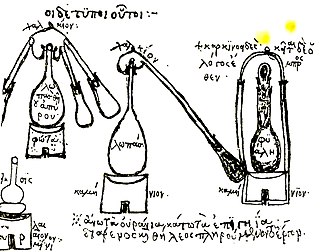
Zosimos of Panopolis was a Greco-Egyptian alchemist and Gnostic mystic who lived at the end of the 3rd and beginning of the 4th century AD. He was born in Panopolis, and flourished ca. 300. He wrote the oldest known books on alchemy, which he called "Cheirokmeta," using the Greek word for "things made by hand." Pieces of this work survive in the original Greek language and in translations into Syriac or Arabic. He is one of about 40 authors represented in a compendium of alchemical writings that was probably put together in Constantinople in the 7th or 8th century AD, copies of which exist in manuscripts in Venice and Paris. Stephen of Alexandria is another.
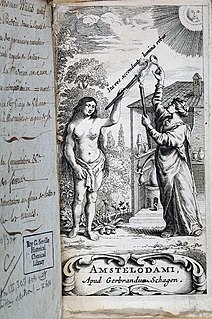
Iatrochemistry is a branch of both chemistry and medicine. Having its roots in alchemy, iatrochemistry seeks to provide chemical solutions to diseases and medical ailments.
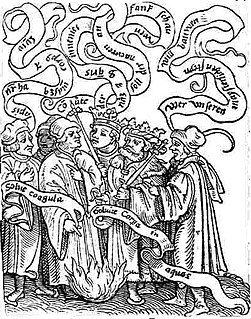
The Turba Philosophorum, also known as Assembly of the Philosophers, is one of the oldest European alchemy texts, translated from the Arabic, like the Picatrix. It is considered to have been written c. 900 A.D.

Giulio Pace de Beriga, also known as Giulio Pacio, or by his Latin name Julius Pacius of Beriga was a well-known Italian Aristotelian scholar and jurist.
Rubedo is a Latin word meaning "redness" that was adopted by alchemists to define the fourth and final major stage in their magnum opus. Both gold and the philosopher's stone were associated with the color red, as rubedo signaled alchemical success, and the end of the great work. Rubedo is also known by the Greek word iosis.

Lullism or llullism is a term for the later philosophical and theological currents related to the philosophy of Ramon Llull. It also refers to the project of editing and disseminating Llull's works. The earliest centers of Lullism were in fourteenth-century France, Mallorca, and Italy.
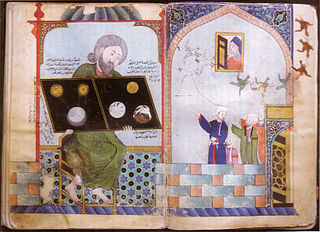
Muḥammad ibn Umayl al-Tamīmī, known in Latin as Senior Zadith, was an Egyptian alchemist who lived from c. 900 to c. 960 AD.

Sir George Ripley was an English Augustinian canon, author, and alchemist.

Theatrum Chemicum is a compendium of early alchemical writings published in six volumes over the course of six decades. The first three volumes were published in 1602, while the final sixth volume was published in its entirety in 1661. Theatrum Chemicum remains the most comprehensive collective work on the subject of alchemy ever published in the Western world.
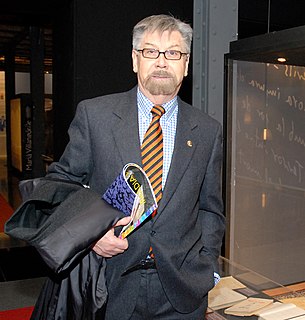
Baltasar Porcel i Pujol was a Spanish writer, journalist and literary critic. His enormous legacy credited him as one of the greatest authors in Catalan literature from the 20th century.
The Buch der heiligen Dreifaltigkeit is an early 15th-century alchemical treatise, attributed to Frater Ulmannus, a German Franciscan.
Philipp Ulstad was a nobleman from Nuremberg, who taught medicine at the Academy in Fribourg at the beginning of the sixteenth century.
Alphidius, also known as Asfidus, Alfidius, Alvidius, is the author name of an unknown, probably medieval Arab alchemist. Nothing is known about him, except some citations and his writings in the 14th century.
Solomon or Salomon Trismosin was a legendary Renaissance alchemist, claimed possessor of the philosopher's stone and teacher of Paracelsus. He is best known as the author of the alchemical works Splendor Solis and Aureum Vellus.
The Ramon Llull Novel Award is an honor given annually to a novel originally written in Catalan. Conceived in 1981 by editor José Manuel Lara Hernández, it is awarded by the Planeta publishing house in conjunction with the Government of Andorra. It confers a monetary prize, originally 250,000 pesetas and now €60,000. It recognizes works of the greatest economic value in the Catalan language.
References
- ↑ "Guido Montanor & Regimens of Fire". Labyrinth Designers & the Art of Fire. 2011-04-06. Retrieved 2019-08-30.
- ↑ Brown, James Campbell (1920). A History of Chemistry from the Earliest Times. P. Blakiston's Son & Company. p. 104. Retrieved 2019-09-27.
- ↑ "Scala Philosophorum". www.alchemywebsite.com. Magnum Opus Hermetic Sourceworks Series No. 42. Retrieved 2019-08-30.